Hundreds mourn murdered LGBT activist in Cameroon
Colin Stewart is a 45-year journalism veteran living in Southern…
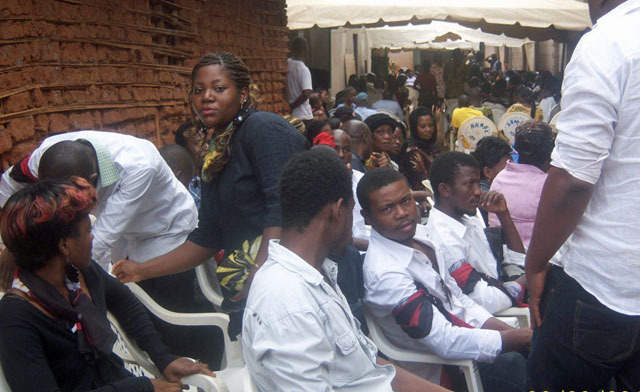
MASS MOURNING FOR SLAIN ACTIVIST
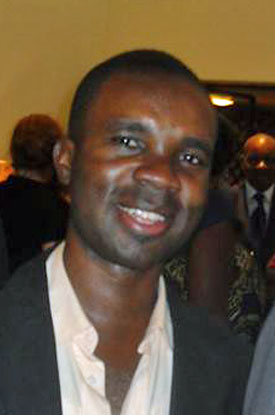
Hundreds of mourners took part in yesterday’s funeral for murdered journalist and LGBT rights activist Eric Lembembe, 33, including the United States ambassador, the United Kingdom’s high commissioner and the European Union’s program director for Cameroon.
The dead, tortured body of Lembembe was discovered in his locked apartment on July 15 by colleagues who contacted police after they became worried that they had not heard from him for days. Police have not found his murderer or murderers, but his colleagues are sure that Lembembe was the victim of a homophobic attack.
Lembembe, a gay man, was executive director of the Cameroonian Foundation For AIDS (Camfaids), an advocacy group fighting against AIDS and for human rights of LGBT people in Cameroon, which is one of the world’s most violently anti-gay nations.
He advocated for LGBTI rights and against AIDS in Cameroon for six years, including recent work with Human Rights Watch (HRW) in documenting human rights violations affecting LGBT people in Cameroon.
As a journalist, his works were published over the years by four newspapers in Cameroon, by the International Lesbian and Gay Association, and by the Erasing 76 Crimes blog. For the blog, which focuses on the human toll of 76-plus countries’ anti-gay laws and the struggle to repeal them, he wrote 42 articles related to LGBT rights in Cameroon, 24 of which were published in English and 18 in French.
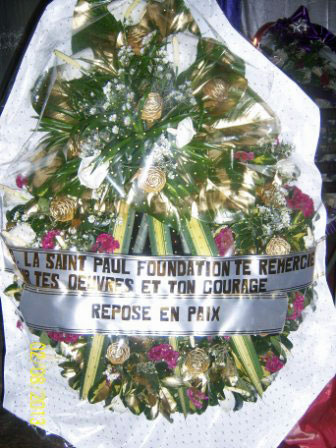
Among his works was one of the blog’s most popular articles, “What traditional African homosexuality learned from the West,” which tells of African societies’ ancient traditions of acceptance of homosexuals, but makes clear that politically active gay-rights groups like those in the Americas and in Europe are a new phenomenon in Africa.
That article and several others by Lembembe about LGBT people facing prison in Cameroon were published earlier this year in the book From Wrongs to Gay Rights.
Remarks at his funeral were limited to one representative of the family and a speaker from Camfaids. The family said that, by request from the Cameroon government, the coffin was sealed. When his body was found, Lembembe’s neck and feet had been broken and several parts of his body had been repeatedly burned with a hot iron.
One activist estimated that a total of 600 people were in attendance. Security for diplomats at the funeral was provided by police and the army.
Lembembe’s body was buried in the Etoudi cemetery after a funeral mass celebrated in a chapel in the Etoudi section of Cameroon’s capital city, Yaoundé,
The funeral was organized by his family, including Lembembe’s mother, Marie Therèse Ohena, with assistance from Camfaids. Supporters from throughout the world contributed money to help pay for the funeral, both through Camfaids and through the San Diego-based St. Paul’s Foundation for International Reconciliation, which last year selected him to help in the fight against AIDS and anti-gay laws.
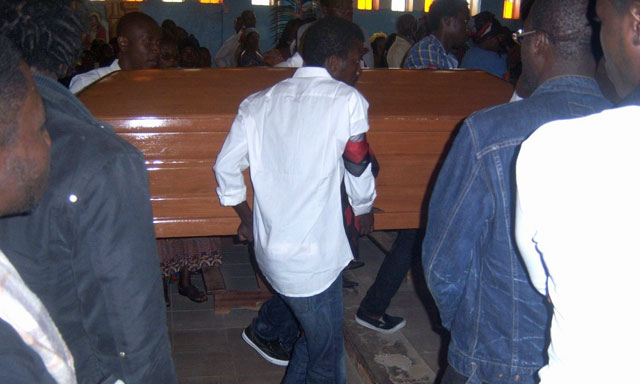
At the funeral, the family’s representative, Lembembe’s uncle, expressed the hope that the police would soon find Lembembe’s killer. He described Lembembe’s life from his birth in 1980, and said that Lembembe had moved out of the family home when he found work, not because of any rift between him and his family.
In remarks that HRW researcher Neela Ghoshal made shortly after his death, she said:
Eric was smart, full of creative plans and a fierceness needed in Cameroon, where homosexual conduct is criminalized. People are arrested frequently and can get up to five years in prison. As a gay man whose activism had made him increasingly open about his identity – a bold stance in Cameroon – it was one of Eric’s goals to change this injustice.
She told of meeting with Lembembe and Cameroonian military police officers, who initially joked about homosexuality:
When Lembembe spoke, th[e] snickers [of Cameroon’s military police] trailed off. “I am Cameroonian, like you,” he said. “Let’s be serious. We all know that gay people exist in Cameroon. In fact, they exist in all of our families. And we all know that they are mistreated. Would you tolerate this abuse if this were your brother? Would you laugh at it, if this were your sister?” Lembembe picked up the stories where I had left off, and the gendarmes listened. They didn’t commit to taking action, not at this initial meeting, where defenses where high, but they listened.
Lembembe’s brand of activism was beginning to shake things up in Cameroon. Along with a cadre of other young, outspoken LGBT-rights activists in Yaoundé and Douala, Lembembe was impatient for change. Statements by President Paul Biya at a news conference in France and by Biya’s foreign minister at the U.N. Human Rights Council, to the effect that Cameroon was “not yet ready” for full equality for its lesbian, gay, bisexual, or transgender citizens, got under Lembembe’s skin. He did not see why he should be treated like a second-class citizen for one day longer.
Erasing 76 Crimes editor/publisher Colin Stewart said:
Eric Lembembe and I began working together in early 2012, when the Erasing 76 Crimes blog had just started. He was selected by the St. Paul’s Foundation to represent Cameroon among a a group of two dozen LGBT activists who gathered in Washington, D.C., at last summer’s International AIDS Conference with the objective of pointing out that criminalization of homosexuality is a great obstacle to achieving the goal of defeating AIDS. Unfortunately, his travel plans were blocked by bureaucratic obstructions in Cameroon.
But he and I could still pursue the struggle as journalists. Before his life was beaten out of him, we worked together intensely online and considered ourselves friends. We would debate wording and story content, especially headlines, because he often believed that my anglophone brevity expressed too little and I often balked at his expressive francophone wordiness.
He worked diligently for human rights in Cameroon, wrote well and often about injustices being inflicted on his fellow countrymen and countrywomen, and now his words have been stopped.
I’m so sad and so mad. And I’m trying to find a way to continue onward along the path that he pioneered in providing information, clarity and compassion in the ongoing struggle for health and human rights for all.
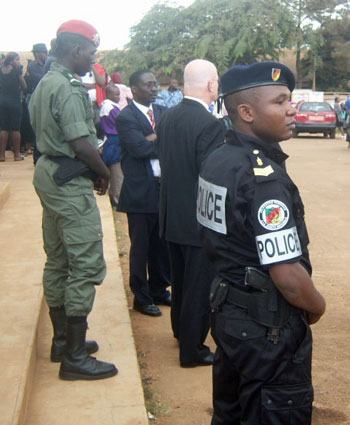
At the time of his death, Lembembe was pursuing a master’s degree in social communication from the Institut Siantou Supérieur. He had previously earned degrees from the University of Douala (2008, licence en communication sociale et médiatique), the Institut Siantou Supérieur, (2007, brevet de technicien supérieur) and the Lycée de Mballa (2000, baccalauréat).
He edited the monthly Tribune du Citoyen, a publication of the non-profit organization Assoal, which focuses on how to improve housing in Cameroon.
He previously wrote for the daily Cameroon Tribune in Douala, the daily Mutations in Yaoundé and the daily La Nouvelle Expression in Yaoundé.
As an activist, he worked for the anti-AIDS human rights group Alternatives-Cameroon in Douala during 2007-2008 and for ADEPEV (Action for the Development and Fulfillment of Vulnerable People) starting in 2010.
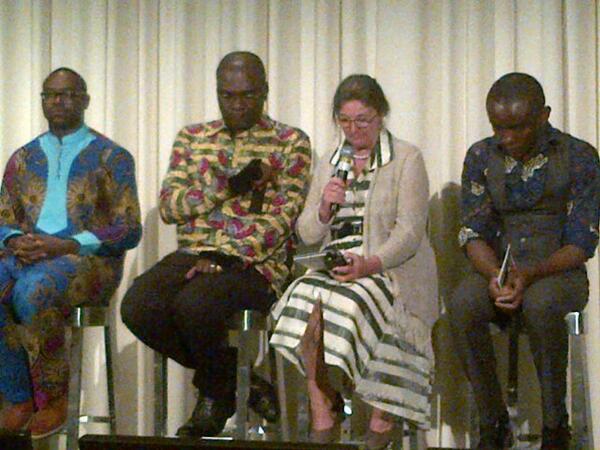
Several years ago Lembembe co-founded Camfaids with Dominique Menoga and until this year served as its executive secretary in charge of communications. After Menoga left for France to seek asylum there, Lembembe became the group’s executive director.
In April, he did research for a project on HIV prevention among vulnerable populations in Cameroon by the John Hopkins Bloomberg School of Public Health and the Global Viral Forecasting Initiative. Starting last year, he helped collect information about the attitudes and actions of Cameroonian men who have sex with men for an AIDS prevention study conducted for the Global AIDS Program of the U.S. Centers for Disease Control and for Cameroon’s Comité National de Lutte contre le SIDA (CNLS) and the Ministry of Public Health. He did similar work in 2011 for a study conducted for Care Cameroun, Alternatives Cameroun and Humanity First Cameroon.
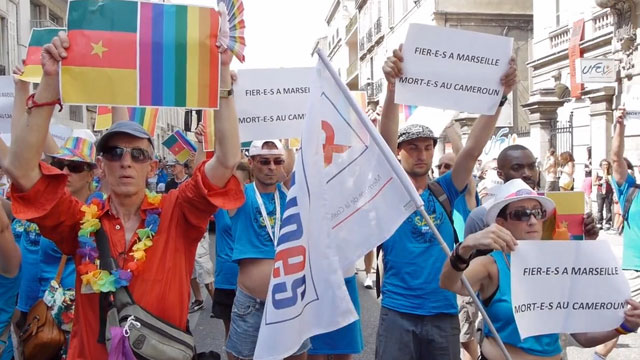
Since his death, protests and memorial services have been held for Lembembe in New York, U.S.; The Hague, the Netherlands; Marseilles, France; and in London, Norwich and Brighton, U.K.
At the same time as this weekend’s funeral ceremonies in Yaoundé, a vigil for Lembembe was held in Paris, France, by 347 Bis LGBT Solidarity Cameroon association (named for the country’s anti-gay law) in collaboration with HRW Paris. The vigil was attended by “30 Cameroonian and French who came from Paris, Brussels, Montpellier and Rouen to pay our last tribute to this great activist who devoted his life to defend the beliefs of the organization he co-founded,” Menoga said.
In preparing for his hoped-for trip to the United States last year, Lembembe wrote this ominously prophetic description of his native country:
Homosexuality is rejected by a majority of people, who think it is a practice imported by whites to continue colonization.
Gays are perceived as failures, sick, sorcerers, brakes on the country’s development.
They pay a high price, sometimes death.
He also described his approach to faith that emerged during a discussion of “Religion, Homophobia and Transphobia” that was organized by Camfaids. Despite many conservative Christian churches’ opposition to homosexuality, he said:
Homosexuals are entitled to strengthen their faith. As the slogans say, ‘I’m gay, lesbian … and God loves me’ and ‘The church welcomes everyone.’ We are all children of the Lord.
I am a practicing Catholic Christian. I go to church all the time and I try whenever possible to meet the commandments of God, despite my homosexuality. I know that Bible condemns homosexuality. But what can I do? I’m a human being.
Related articles
- 3 LGBT activists arrested as Cameroon harassment continues (76crimes.com)
- Cameroon: LGBT activists in custody; harassment continues (76crimes.com)
- Beating death of LGBT activist Eric Lembembe in Cameroon (76crimes.com)
- Cameroon activist tortured, killed; the nation must respond (76crimes.com)
- Autopsy delays slain activist’s funeral; donations still needed (76crimes.com)


